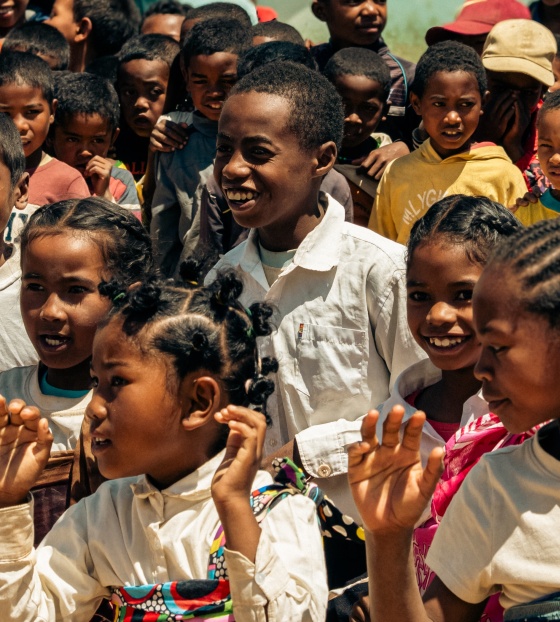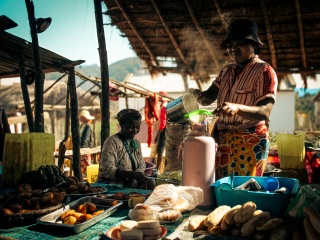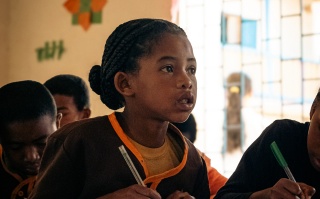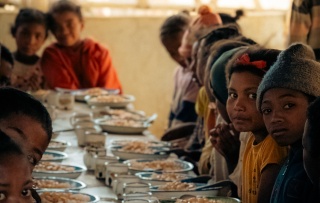

A catalyst for change in rural Madagascar
Jamie Spencer, founder of Feedback Madagascar, talks about how Mary’s Meals’ school feeding programme can be a catalyst for change for rural communities in Madagascar.
Feedback Madagascar works in remote forest areas of southeast Madagascar helping the local communities to live sustainably, manage the forest habitat and tackle climate change. The charity works to provide emergency relief, install water boreholes, build schools, help establish sustainable crops, and protect human rights and rural industries.
Since 2018, Mary’s Meals has collaborated with Feedback Madagascar to deliver nutritious daily school meals to more than 80,000 children across 450 primary schools across four regions in Madagascar.
In this interview, I talk to Jamie Spencer, CEO of Feedback Madagascar, about how Mary’s Meals’ school feeding programme is acting as a catalyst for change in rural communities.

Mary’s Meals. Hello Jamie. What first brought you to Madagascar and how long has Feedback Madagascar been operating in the country?
Jamie Spencer: Like many visitors to Madagascar, I first came here because of the unique nature that has evolved. Through studying lemurs, I became interested in how to protect the forests and all the wonders of its natural habitats.
But I very quickly realised that in order to look after the forest, you had to solve the problems of the people in rural Madagascar, which are health, lack of education, lack of food, etc. So very quickly, I turned my attention to the idea that through addressing these human problems, we might be able to reduce the pressure on the forest.
This was how Feedback Madagascar was born – and we’ve been working here for almost 30 years, focusing on improving education, health, livelihoods, agriculture and human rights. We've built about 100 schools and over 300 boreholes to combat waterborne diseases, and we've worked on improving farming techniques.
We work here for two main reasons – to try and improve the lives of the people who face all sorts of different challenges, and to help look after the remaining forest and the extraordinary nature that can be found here.

How is partnership with Mary’s Meals enabling Feedback Madagascar to improve the lives of local people and communities?
When we partnered with Mary's Meals to introduce school feeding into rural communities in Madagascar, we understood it would have a great impact on education, as many children in these rural areas were not going to school because of lack of food and money.
What we found very quickly was the working relationship we, as a non-governmental organisation, had with each village and community immediately strengthened. The way Mary's Meals are delivered with volunteer parents organising themselves to transport, prepare and serve the food has inspired communities to work with us, for example, on building boreholes to get clean water into their village and trying out new farming techniques to grow yams and sweet potatoes.
The impact of Mary’s Meals’ school feeding program is that children are coming to school to eat, which is reducing their hunger and improving their educational outcomes. But we're also finding that school feeding acts as a catalyst for communities to carry out other important development work.

Could you expand on this idea that Mary’s Meals is a catalyst for further development in rural communities in Madagascar?
Absolutely. Teachers, parents and the children themselves are excited, enthusiastic and really keen to get involved with school feeding. The success of school feeding breeds trust, engagement and confidence to work on more complicated and challenging projects that expect people to adapt their traditional techniques.
For example, some of the projects are perceived by our local partners as easy and deliver immediate benefits. While others are much harder. For example, planting trees to try and restore the forest is difficult because it’s a long-term and involves new techniques. It’s harder for people to see the benefits they’re going to get by doing it.
But off the back of the success of school feeding, many of the communities we're working with have asked us to help solve the problem of the lack of clean water. And by working with us to build boreholes, they now have clean water that can be used to cook the food at school and in homes. So, the catalytic effect of school feeding empowers our relationships with local communities to take on more projects that build on our impact.
On the face of it, it's just feeding children in school. But the impact is huge and almost never ending. One of the greatest attributes of the Mary’s Meals school feeding program is that it is in it for the long run – the commitment and dedication in to work with the schools and deliver the school feeding every day until the problems are solved is more than money can buy.
It costs just £19.15, €22, $25.20 USD or $31.70 CAD to provide a child with school meals for an entire school year. We currently serve daily meals to more than 88,500 children in primary schools, education centres and detention centres every school day. Your donation will help us reach more children in Madagascar – giving hope to the children and the communities they live in.
Tom Carlile is our Head of Creative Solutions.